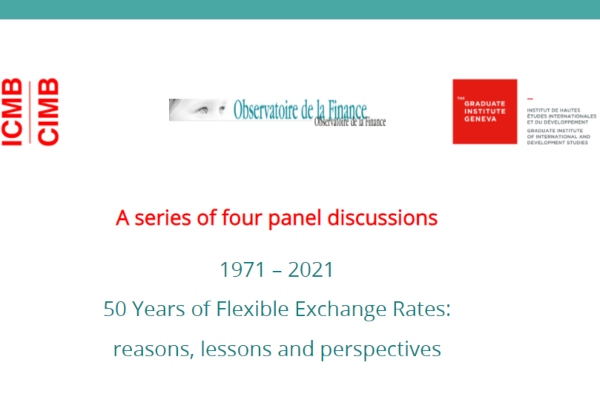1971 – 2021: 50 ans de taux de change flexibles : raisons, leçons et perspectives (25 Février 2022, Global)

Traduire:
1971 – 2021: 50 Years of Flexible Exchange Rates: reasons, lessons and perspectives
A series of four panel discussions
Registration is required, with the option to register for all panels or only some.
Register here
This year marks the 50th anniversary of the end of the Bretton Woods system and the move to flexible exchange rates. Such a juncture invites us to reflect on the consequences – the long-term dynamics and processes still shaping our world – and confronts us with the challenges ahead for the global monetary and financial system.
Three Geneva based institutions (Graduate Institute, Observatoire de la Finance & the International Center for Monetary and Banking Studies) are jointly organizing a series of panel discussions on Zoom in March 2022, with sessions each Tuesday at 6pm CET. Four are planned (March 1, 8, 15, and 22) with details provided below.
An abrupt move to a new era
In August 1971, President Nixon announced the suspension of the gold convertibility of the dollar after a three-day confidential meeting at Camp David with his closest aides. The decision was motivated not only by internal economic concerns, but also a desire to protect the central role of the dollar in the world economy. Despite attempts to contain the damage to international monetary stability, the final collapse of the Bretton Woods system would follow two years later. Nixon’s decision opened the era of flexible exchange rates, tossing policy makers into unfamiliar new territory.
Seen from today’s perspective, the decision fundamentally changed economic and monetary arrangements worldwide. Central banks had to find new foundations for their policies. New spaces opened for private actors and financial innovation surged, subsequently leading to the creation of new markets and instruments. Modern international finance and the process of financialization are the most evident, if unanticipated, consequences of this decision.
Flexible exchange rates were supposed to expand the toolbox of policy makers and free them from outside constraints, giving them greater autonomy to focus on their countries’ needs. Did this promise materialize? The era of flexible rates did not mark the end of balance of payments disequilibria, nor financial crises. To cope, public policies have evolved and policy makers are constantly looking for better tools.
The shift also impacted the economics profession and research agendas in universities, banks, and public institutions. New problems, new theories, and even new disciplines – such as international finance – have emerged to align with new realities.
Fifty years later, the world is still looking to deliver economic, financial, and political stability. What lessons and what perspectives can we draw for shaping a better and more sustainable future? Is it possible to envisage a set of policies and institutions consistent with a more resilient and harmonious international monetary and financial system?
No fewer than 20 world-class experts will share their thoughts, recollections, and concerns with us in four panels:
Organizing committee
- Paul Dembinski (Observatoire de la Finance & University of Fribourg),
- Ugo Panizza (Geneve Graduate Institute & ICMB),
- Alexandre Swoboda (Geneva Graduate Institute),
- Cédric Tille (Geneva Graduate Institute).
Programme
Session 1, March 1 2022 (6 PM, CET): What happened, when, and why? How did decision makers perceive the situation?
Introductory remarks, Ugo Panizza, Geneva Graduate Institute & ICMB
-
- Moderator: Rui Esteves, Geneva Graduate Institute
- Jacques de Larosière, former Managing Director of IMF
- Barry Eichengreen, University of California Berkeley
- Catherine Schenk, Oxford University
- Harold James, Princeton University
Session 2, March 8 2022 (6 PM, CET): What problems did the move to floating rates solve? What have we learnt on the pros and cons of policy regimes?
-
- Moderator: Paul Dembinski, Observatoire de la Finance
- Paulina Restrepo, Federal Reserve Bank of Saint Louis
- Ashoka Mody, Princeton University
- Ladislau Dowbor, Pontifical University of Sao Paulo
- Charles Pictet, Pictet&Cie
Session 3, March 15 2022 (6 PM, CET): How has the end of Bretton Woods influenced economic research?
-
- Moderator: Nathan Sussman, Geneva Graduate Institute
- Maury Obstfeld, University of California Berkeley
- Atish Ghosh, International Monetary Fund
- Beatrice Cherrier, Ecole Polytechnique
- Linda Goldberg, Federal Reserve Bank of New York
Session 4, March 22 2022 (6 PM, CET): The inescapable dollar? In search of building blocks for monetary and financial governance.
Welcome remarks by Marie-Laure Salles, Director, Geneva Graduate Institute
-
- Moderator: Beatrice Weder di Mauro, Geneva Graduate Institute
- Claudio Borio, Bank for International Settlements
- Pierre-Olivier Gourinchas, International Monetary Fund
- Philip Lane, European Central Bank
- Richard Kozul-Wright, UNCTAD
Concluding remarks by Alexander Swoboda, Geneva Graduate Institute.
This invitation was published at the website of OBSFIN:

